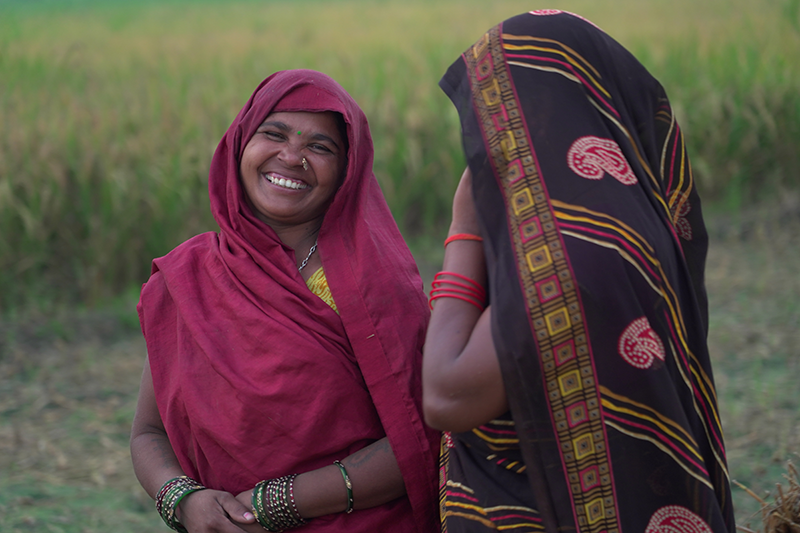Scaling Climate-Smart Rice to 1M Indian Farmers

The $325M Uttar Pradesh AGREES project scales WRG’s climate-smart agriculture model to reach 1 million farmers.
The $325 million Uttar Pradesh (UP) Agriculture Growth and Rural Enterprise Ecosystem Strengthening (UP-AGREES) Project marks a new chapter in scaling climate-smart agriculture practices to improve livelihoods and resilience in India. Designed to support one million producers across Eastern UP and the Bundelkhand regions, UP-AGREES builds on years of collaborative work led by the 2030 Water Resources Group (WRG) and its partners through the UP PRAGATI Accelerator.
Since 2018, WRG has engaged closely with the Government of Uttar Pradesh (GoUP) and key stakeholders to tackle longstanding agricultural challenges in India’s most populous state. While UP is a vital contributor to the nation’s food security—leading in wheat production, ranking second in rice, and serving as a top agricultural exporter—it grapples with water-intensive crop cultivation, climate variability, and low per-hectare productivity. Many smallholder farmers lack access to modern technologies, adequate finance, and reliable infrastructure. These constraints, coupled with fragmented service delivery, inhibit the sustainable growth of the state’s agricultural sector.
From PRAGATI to AGREES: Building on a Proven Platform
Through the UP PRAGATI platform, launched in partnership with the GoUP, Bill & Melinda Gates Foundation, and leading private-sector innovators, WRG helped develop, test, and refine strategies to address these challenges. The accelerator focused on aligning climate-smart, water-efficient agricultural practices with government initiatives, leveraging market-based approaches, and strengthening value chains for key crops like rice, sugarcane, mango, millets, and horticulture.
PRAGATI’s work spans three core objectives:
- Enhance water use efficiency: Improve agricultural water productivity by expanding micro-irrigation and transitioning to climate-smart rice-wheat systems.
- Increase agricultural productivity: Improve access to farm machinery and digital platforms, enabling farmers to adopt water-saving and yield-boosting practices.
- Reduce greenhouse gas emissions: Support climate-positive farming that reduces emissions and promotes regenerative agriculture.
To achieve these goals, PRAGATI integrated innovative service delivery models, expanded farmers’ access to credit and inputs, and harnessed digital tools to lower transaction costs and improve market transparency. The results in just the first two years show tremendous promise:
- 290,000 farmers have adopted precision irrigation, saving 18–35% water while boosting productivity.
- DSR adoption - a proven water-efficient alternative to traditional transplanting rice - has expanded 400% from 20,000 hectares in 2023 to 80,000 hectares in 2024, benefiting 200,000 farmers.
- Micro irrigation was installed on over 90,000 hectares for 72,000 farmers. By the end of FY24, the Uttar Pradesh Micro-Irrigation Platform (UP-MIP), launched in July 2023, was disbursing an average subsidy of $0.24 million and installing more than 350 micro irrigation systems per day.
WRG’s Role in Scaling Innovation
Under PRAGATI, WRG facilitated multi-stakeholder dialogues and incorporated feedback from farmers, extension officers, and market players to validate and refine interventions. This rigorous testing phase ensured that by the time UP-AGREES was conceived, the state had a menu of proven, climate-smart approaches ready for large-scale implementation. WRG leveraged its position as a trust fund hosted by the World Bank to facilitate early-stage dialogues between the GoUP and international finance partners. WRG’s strategic guidance influenced key components of UP-AGREES, including:
- Low-Carbon Agriculture: WRG co-developed the Center for Climate Resilient Agriculture Systems (C-CRAS), Asia’s first dedicated initiative for measuring, monitoring, reporting, and verifying greenhouse gas (GHG) emissions in agriculture. This will enable farmers to access carbon markets, incentivizing the adoption of low-methane rice varieties and regenerative farming.
- Mechanization and Water Use Efficiency: WRG helped shape strategies to optimize water use, especially for crops like rice and sugarcane. By promoting mechanization and precision agriculture, WRG ensured that UP-AGREES would include methods to increase yields, reduce resource inputs, and enhance farm resilience.
- Digital Ecosystems: Recognizing the importance of timely, transparent information flows, WRG championed the integration of digital platforms. These systems streamline service delivery, improve market information access, and connect farmers to financing and advisory services—an essential shift toward inclusive and data-driven decision-making.
Both UP-AGREES and PRAGATI are delivered through the same Special Purpose Vehicle (SPV), the UP Diversified Agricultural Support Program (UP-DASP), ensuring alignment and continuity between these initiatives.
A Blueprint for Transformation
UP-AGREES now takes forward the interventions and approaches proven through PRAGATI. With WRG’s contributions woven into its design, the project aims to not only enhance productivity and resilience but also open new economic opportunities, especially for women farmers and entrepreneurs. UP-AGREES will drive the creation of geographic clusters connecting producers, agribusinesses, and public institutions, strengthening value chains and enabling greater market access—both locally and globally.
“The project will promote sustainable practices such as low-methane rice varieties, rice residue collection and conversion into biogas, and optimized fertilizer use, reducing agriculture’s impact on climate change and boosting productivity,” said Auguste Tano Kouame, the World Bank’s Country Director for India.
The momentum since FY22 has prompted the government to scale up the program within Uttar Pradesh, and both the World Bank’s Global Agriculture and Global Water departments are interested in replicating the model in other states, including Bihar, Odisha, and West Bengal. Additionally, other state governments such as Gujarat and Andhra Pradesh have expressed interest in adopting the UP Accelerator model.
By linking proven solutions with large-scale financing, WRG has charted a course for change in Uttar Pradesh’s agricultural sector. This integrated approach—combining climate-smart technologies, resource-efficient practices, digital infrastructure, and inclusive market development—is fast becoming a model for impactful partnerships, paving the way for sustainable agricultural growth and resilience.
